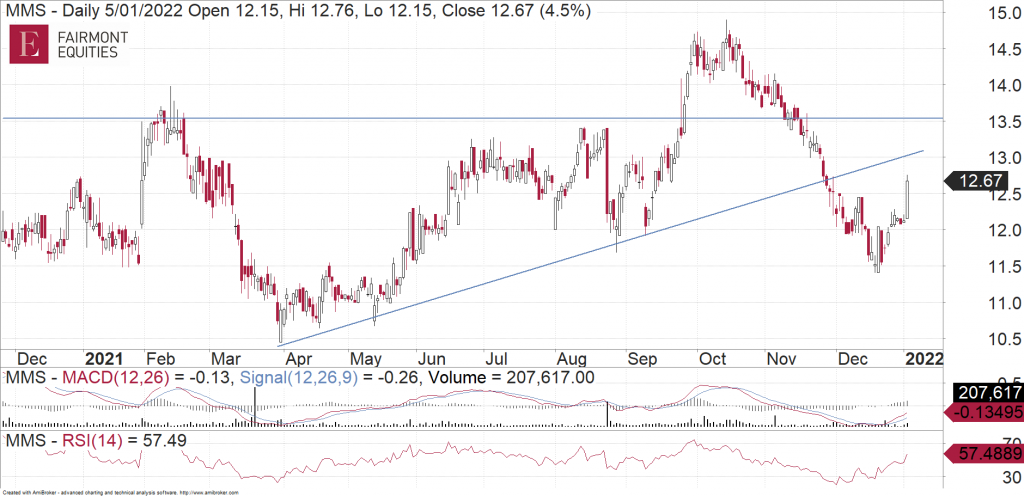The share price of McMillan Shakespeare (ASX:MMS) has endured a period of weakness since late September. One of the reasons for the weakness has been the impact from new vehicle supply constraints on the novated leasing business. We recently researched the Company to assess whether there were other fundamental drivers that could offset the earnings impact. Is the market overlooking earnings potential from other areas of the business & initiatives? Or are the benefits from these too far into the long term to warrant a re-rating in the shares over the short-term?
About McMillan Shakespeare
McMillan Shakespeare is a market-leading provider of salary packaging, novated leasing, NDIS plan management, asset management, and related financial products and services. The Company reports across three segments: Group Remuneration Services (GRS), Asset Management and Retail Financial Services (RFS). The GRS segment, whose primary offering is salary packaging and novated leases, is the main earnings driver.
GRS is a considered the highest-quality segment within MMS’ business portfolio and now contributes around 80% of group EBITDA, due to the combined factors of strong organic growth and earnings declines in the Asset Management and RFS segments.
Key Fundamental Drivers
New Vehicle Supply Issues Impacting Novated Leasing Business
The Novated Leasing business faces a challenging outlook. Notwithstanding that new car sales have increased up until October 2021, supply chains remain under pressure. This has seen demand outstrip supply, delaying vehicle deliveries and resulting in Original Equipment Manufacturers prioritising the full-price retail channel (i.e dealerships). In turn, this has resulted in delays for delivery into the novated lease channel.
MMS was able to grow its novated leasing volumes by 2.2% in FY21, in comparison to a 2.8% decline in novated leasing volumes reported by ASX-listed competitor Smartgroup Corporation (ASX: SIQ) in FY21. Supply constraints are expected to continue through to the end of calendar year 2022, given that demand levels remain elevated (1Q22 demand was 114% of 1Q19 levels). This is a result of novated order activity increasing in NSW & Victoria following the easing of COVID-19 restrictions.
Accordingly, MMS’ novated leasing volumes for FY22 are expected to grow at a similar rate to FY21.
Long-term Earnings Potential from Plan Partners
Plan Partners specialises in providing financial-plan management and support coordination to people with a disability who are participating in the National Disability Insurance Scheme (NDIS).
Operating metrics for Plan Partners are impressive. For FY21, MMS reported client Funds Under Administration (FUA) was 30% higher than 1H21. Efficiency since FY19 has increased to 2.56x, and customer retention has improved from 78% to 89%.
A key factor underpinning the growth in FUA (+76% from FY19 to FY21) is that the portion of NDIS plans managed by a plan manager has increased from 30% in June 2019 to 49% in June 2021. This percentage is expected to increase in the future given the complexity of NDIS participants self-managing their plans and the shift away from Agency-managed plans.
Given that Plan Partners is still only a minor contributor to the GRS segment’s earnings base (no contribution was reported in FY21), MMS intends to pursue further bolt-on M&A opportunities. This is to augment the impressive organic growth inherent in the business.
Earnings Benefit From Warehouse Facility Expected Longer Term
In 2020, MMS decided to pursue its own securitisation warehouse as a funding option alongside existing Principal & Agency (P&A) funders. The Company will continue to fund ~80% of deals via P&A and expects warehouse funding to represent ~20% of funding volume going forward.
The idea is to enable more customers access to novated leasing products and services, thereby increasing volumes. Initial activity will focus on credit where approval is not granted by existing 3rd party funders.
The warehouse facility is significantly progressed and awaiting credit licence approval from ASIC. As such, volume from warehouse financing is not expected to be material until FY23. While the establishment of a securitisation warehouse is expected to impact earnings in FY22 and FY23, profitability under the warehouse model is expected to exceed traditional P&A funding model by the end of FY25. Further, the NPV of a single lease under the warehouse model is ~15% higher than P&A.
EBITDA Margin Expansion Not Flowing Through as Expected
The onset of COVID-19 has meant that the implementation of the 3-year cost savings program implemented in FY18 has extended into FY22/23. In addition, the delays in implementing the cost savings program as a result of COVID-19 disruptions impacted group EBITDA margin in FY20. This fell by 170 basis points to 22.5%. While EBITDA margin in FY21 recovered back to FY19 levels, we had previously expected the flow-through of cost savings to underpin an expansion in EBITDA margin from FY22-24.
However, based on current estimates, EBITDA margin over this period is expected to increase slightly in comparison to FY21. We consider that there are two factors supporting this view:
1. The investment in technology is higher than what MMS had envisaged and as such, meaningful margin expansion appears to be elusive.
2. Some of the planned expenditure from past years may have been shifted into FY22/23 to support the establishment of a warehouse funding option.
Fundamental View
The shares are currently trading on a 1-year forward P/E multiple of ~12x, which is broadly in line with the long-term average multiple. With an EPS growth profile of <4% over FY21-24 on a CAGR basis, limited EBITDA margin growth out to FY24, new vehicle supply issues impacting novated leasing volumes, and the benefits from warehousing funding more likely to be evident in the longer-term, we prefer to remain on the sidelines for now.
Charting View
After breaking above $13.50 in September, we saw MMS rally for a couple of weeks before pulling back again. The recent pullback has seen it break under $13.50 support and it is now trying to bounce again. Any rally from here will encounter some strong resistance around $13 – $13.50. We need to see it get back above those levels before we can be confident it can get back into an uptrend. For the moment it looks to remain range-bound.

Michael Gable is managing director of Fairmont Equities.
Current share prices available here.
You can learn more about technical analysis in this article.
An 8-week FREE TRIAL to The Dynamic Investor can be found HERE.
Would you like us to call you when we have a great idea? Check out our services.
Disclaimer: The information in this article is general advice only. Read our full disclaimer HERE.
Like this article? Share it now on Facebook and Twitter!

